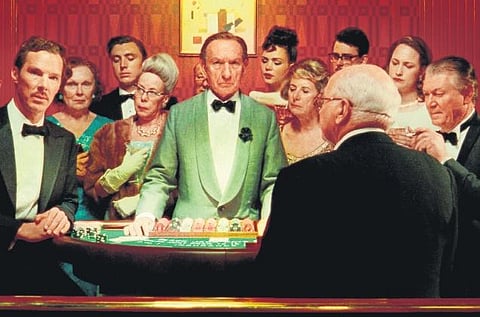

Wes Anderson’s 37-minute short adaptation of Roald Dahl’s story, The Wonderful Story of Henry Sugar, is not only a star-studded affair but also a mythical concoction of Dahl and Anderson’s residual introspection of storytelling that gives a lot to think after you chew all that you have bitten. Apart from a Matilda or a Charlie and Chocolate Factory, Dahl’s short stories pondered on the state of macabre and darkness that was aimed at slightly older audiences, with themes of comeuppance, and denouement. Now this, coupled with Anderson’s style of filmmaking and aesthetical fondness for parallels and pastel colour palette, only adds to multiple interpretations of understanding desire and limits of mankind.
The short begins with Roald Dahl (Ralph Fiennes in one of the many roles) from his famous writing hut, narrating the tale of the titular character (Benedict Cumberbatch), who at the peak of his greediness of wanting more, stumbles across a book that looks out of place in a library filled with hardbound, pudgy books. One can’t miss noting Benedict looking straight into the camera when he says “Henry wasn’t interested” which comes as part of the narration, but as soon as the words “his eye was caught and held by something” are uttered, Benedict’s vision does the corresponding action. This behavioral pattern of the subject turning into the narrator is the natural occurrence through which Henry Sugar’s story is told. The narrators keep changing in each of the flashbacks and it raises the question about who the listener is.
As the short explores the whimsical introspection on what greediness can do to a man, we are given a peek through how Henry attains the gift of seeing with eyes closed. We see Calcutta’s Dr Chatterjee (Dev Patel) talk about the legacy of Imdad Khan (Ben Kingsley), who did the same. Through Imdad’s story of attaining the ability to see images in more than one way and the evolving arc of Henry from greediness to self-enlightenment, the tale keeps teasing us with philosophical understanding about what life means when you attempt to grab what is not yours. The final lesson is taught when Henry’s vision gets so strong that he can even see a lump travelling up his heart.
In The Wonderful Story of Henry Sugar, if there is one thing that’s still, it is the camera frame that gives multiple ways to stage the settings. There is so much movement going on as the dynamics change with respect to ratio and miniature settings of cardboard plasticity. But there is not even a slight uneasiness in the screenplay, even when characters face a stationary camera. The cinematography and impeccable art direction build the world of this spiritual tale. The direction and lead cast’s performance only makes it all the more meditative. In this delectably put-together story of opulence, Anderson’s unique style of narrating with layered style shines through.
The mannerisms of the actors are quirkily strange and most of the time dead pan, which silently makes a commentary on what the human psyche really wants when the mask drops.
Film: The Wonderful Story of Henry Sugar
Cast: Ralph Fiennes, Dev Patel, Benedict Cumberbatch, Ben Kingsley
Director: Wes Anderson
Streamer: Netflix
Rating: 3.5/5